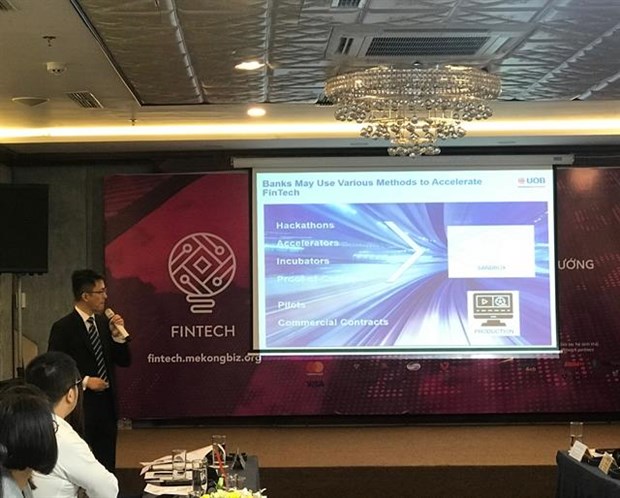Fintech needs improved legal framework: experts
To develop financial technology, a comprehensive legal framework and cooperation between banks and fintech businesses are required, experts told a conference organised by the State Bank of Vietnam (SBV) and Asian Development Bank (ADB) in Ho Chi Minh City on September 10.
 A conference on how Vietnam's financial technology should be developed was held in HCM City on September 10 (Photo: VNA)
A conference on how Vietnam's financial technology should be developed was held in HCM City on September 10 (Photo: VNA)HCM City (VNA) - To
develop financial technology, a comprehensive legal framework and cooperation
between banks and fintech businesses are required, experts told a conference
organised by the State Bank of Vietnam (SBV) and Asian Development Bank (ADB)
in Ho Chi Minh City on September 10.
Ngo Van Duc, deputy head of the Payment Method Supervision Division under the SBV’s Payment Department, said the telecommunication infrastructure had been improving, with more than half of the population using smartphones and the internet and companies providing 3G and 4G services nationwide.
Around 63 percent of adults in the country had bank accounts as of last year, he said.
Thirty one non-bank institutions had been licensed for providing payment intermediary services, while 24 banks had launched QR code payment services with over 50,000 payment spots, he said.
More and more monetary transactions are made on the internet and mobile phones, he pointed out.
Regulations for fintech were still limited, and completing a comprehensive legal framework for fintech was crucial amid the ongoing 4th industrial revolution, he added.
Since 2017, the SBV has been supporting the development of fintech, establishing a steering committee to focus on the fintech eco-system and signing cooperation agreements in addition to the planned proposal for creating a regulatory sandbox some time this year.
A regulatory sandbox will allow innovative fintech to be developed and tested to perfect such technology while reducing the risk for customers.
The model has been launched in several countries such as Singapore, Malaysia and Japan.
Authur Leong, head of strategy, special project and fintech investment at Singapore’s United Overseas Bank Limited, said banks and fintech businesses should cooperate rather than compete against each other.
Traditional banks working with such businesses could benefit through creating new capabilities and competencies and improving their overall customer experiences, while small fintech businesses that partner with established banks could enjoy higher visibility and customer trust, he said.
He added that the development of a fintech eco-system required a talented workforce through STEM education, reskilling and attracting overseas talent in addition to other factors such as regulatory framework, payment infrastructure and sandbox to promote innovation testing.
Dinh Ba Tien, head of the IT Department at the Vietnam University HCM City - University of Science, said IT students were taught artificial intelligence, kept up to date with newest developments and had the opportunity to handle real world applications.
"There are many examples of technological applications in banking such as blockchain for more trusted track records and ChatBots for communicating with customers," Tien said, adding that in future AI could be used in areas such as face recognition, data analytics for loans and fraud detection.
According to the Ministry of Education and Training, there are around 153 schools and universities with IT or computer science programmes, and 35,000 people graduate in the field annually./.
Ngo Van Duc, deputy head of the Payment Method Supervision Division under the SBV’s Payment Department, said the telecommunication infrastructure had been improving, with more than half of the population using smartphones and the internet and companies providing 3G and 4G services nationwide.
Around 63 percent of adults in the country had bank accounts as of last year, he said.
Thirty one non-bank institutions had been licensed for providing payment intermediary services, while 24 banks had launched QR code payment services with over 50,000 payment spots, he said.
More and more monetary transactions are made on the internet and mobile phones, he pointed out.
Regulations for fintech were still limited, and completing a comprehensive legal framework for fintech was crucial amid the ongoing 4th industrial revolution, he added.
Since 2017, the SBV has been supporting the development of fintech, establishing a steering committee to focus on the fintech eco-system and signing cooperation agreements in addition to the planned proposal for creating a regulatory sandbox some time this year.
A regulatory sandbox will allow innovative fintech to be developed and tested to perfect such technology while reducing the risk for customers.
The model has been launched in several countries such as Singapore, Malaysia and Japan.
Authur Leong, head of strategy, special project and fintech investment at Singapore’s United Overseas Bank Limited, said banks and fintech businesses should cooperate rather than compete against each other.
Traditional banks working with such businesses could benefit through creating new capabilities and competencies and improving their overall customer experiences, while small fintech businesses that partner with established banks could enjoy higher visibility and customer trust, he said.
He added that the development of a fintech eco-system required a talented workforce through STEM education, reskilling and attracting overseas talent in addition to other factors such as regulatory framework, payment infrastructure and sandbox to promote innovation testing.
Dinh Ba Tien, head of the IT Department at the Vietnam University HCM City - University of Science, said IT students were taught artificial intelligence, kept up to date with newest developments and had the opportunity to handle real world applications.
"There are many examples of technological applications in banking such as blockchain for more trusted track records and ChatBots for communicating with customers," Tien said, adding that in future AI could be used in areas such as face recognition, data analytics for loans and fraud detection.
According to the Ministry of Education and Training, there are around 153 schools and universities with IT or computer science programmes, and 35,000 people graduate in the field annually./.












